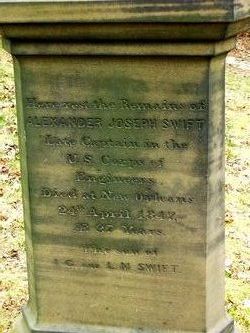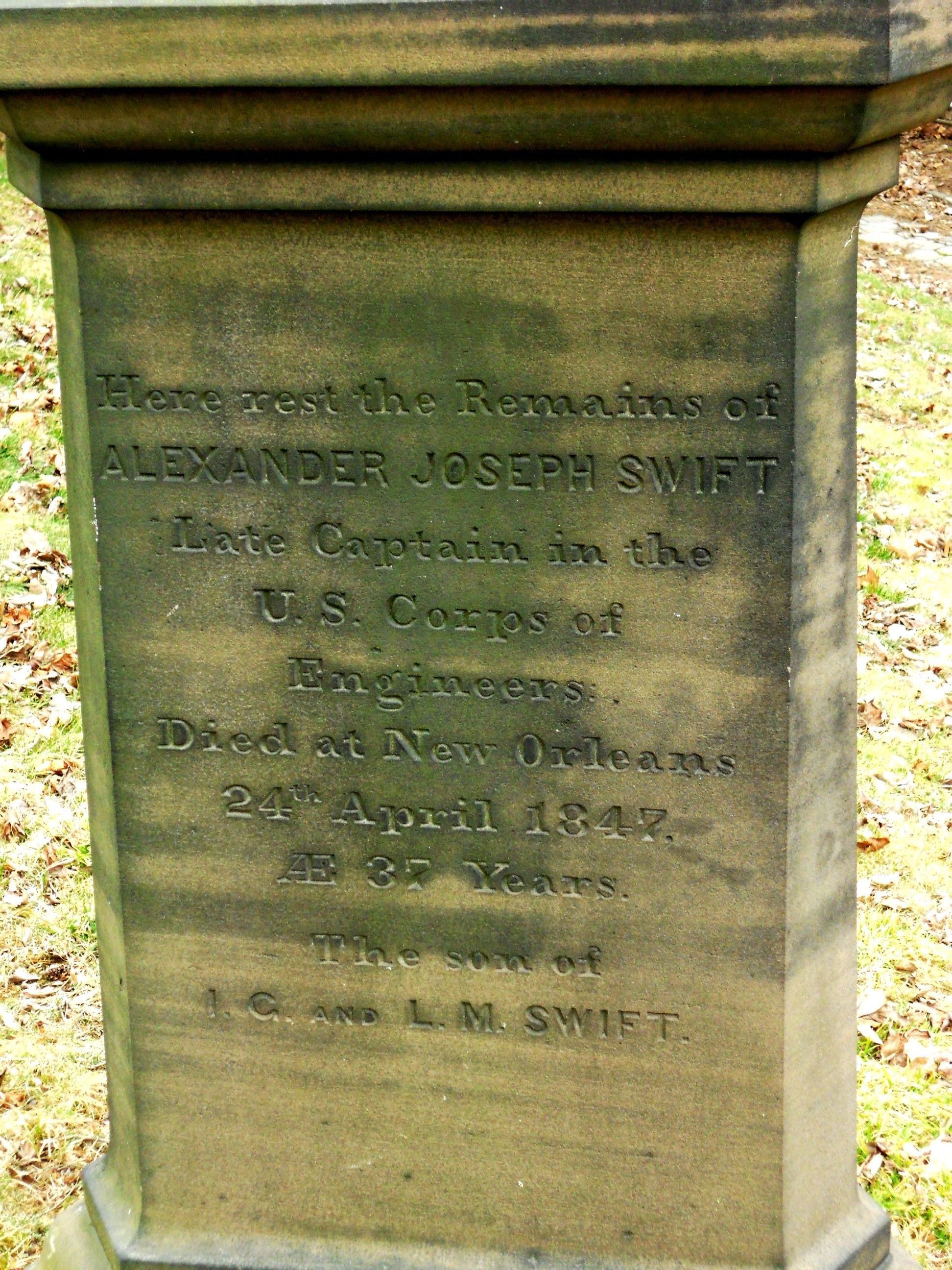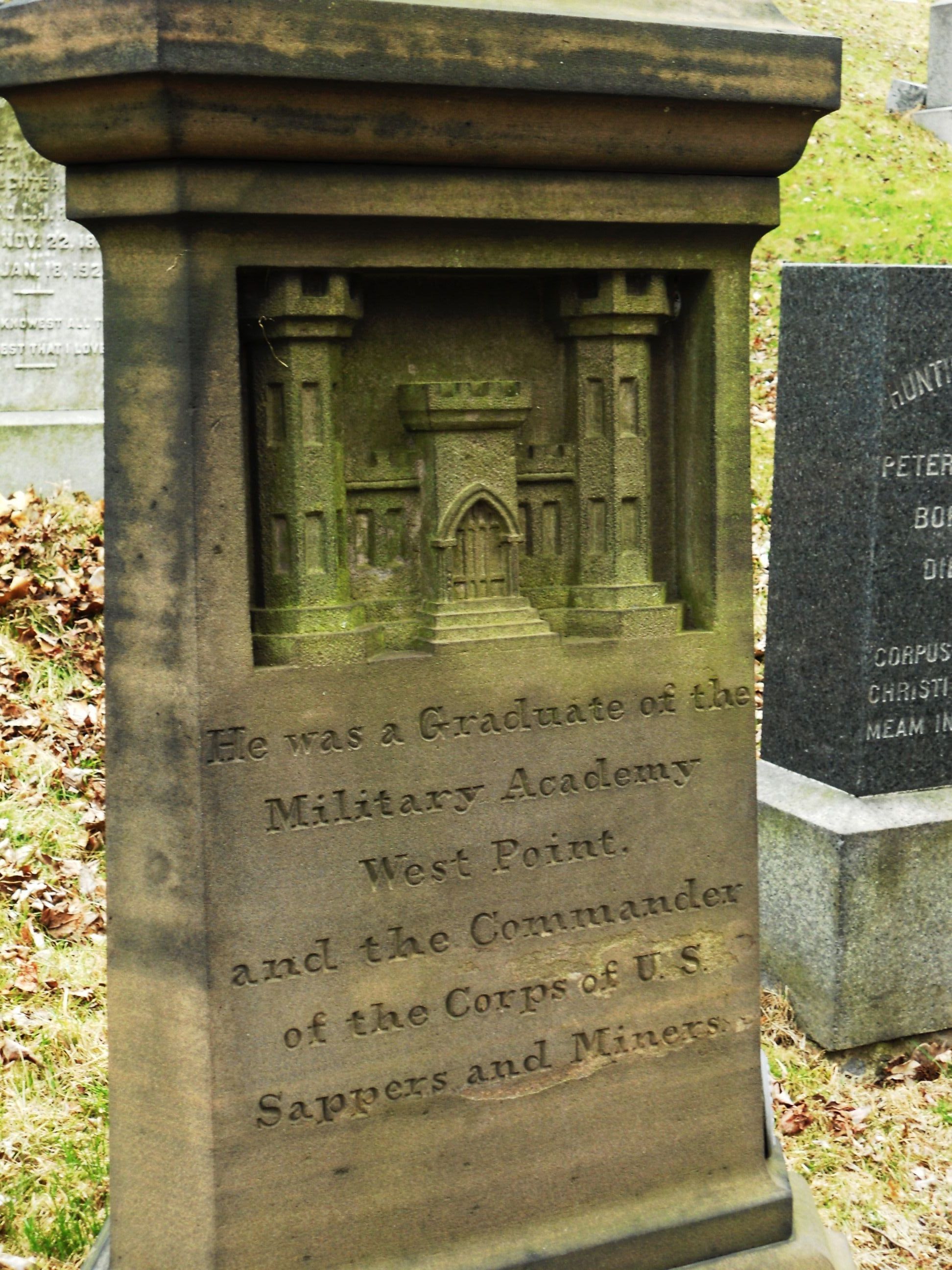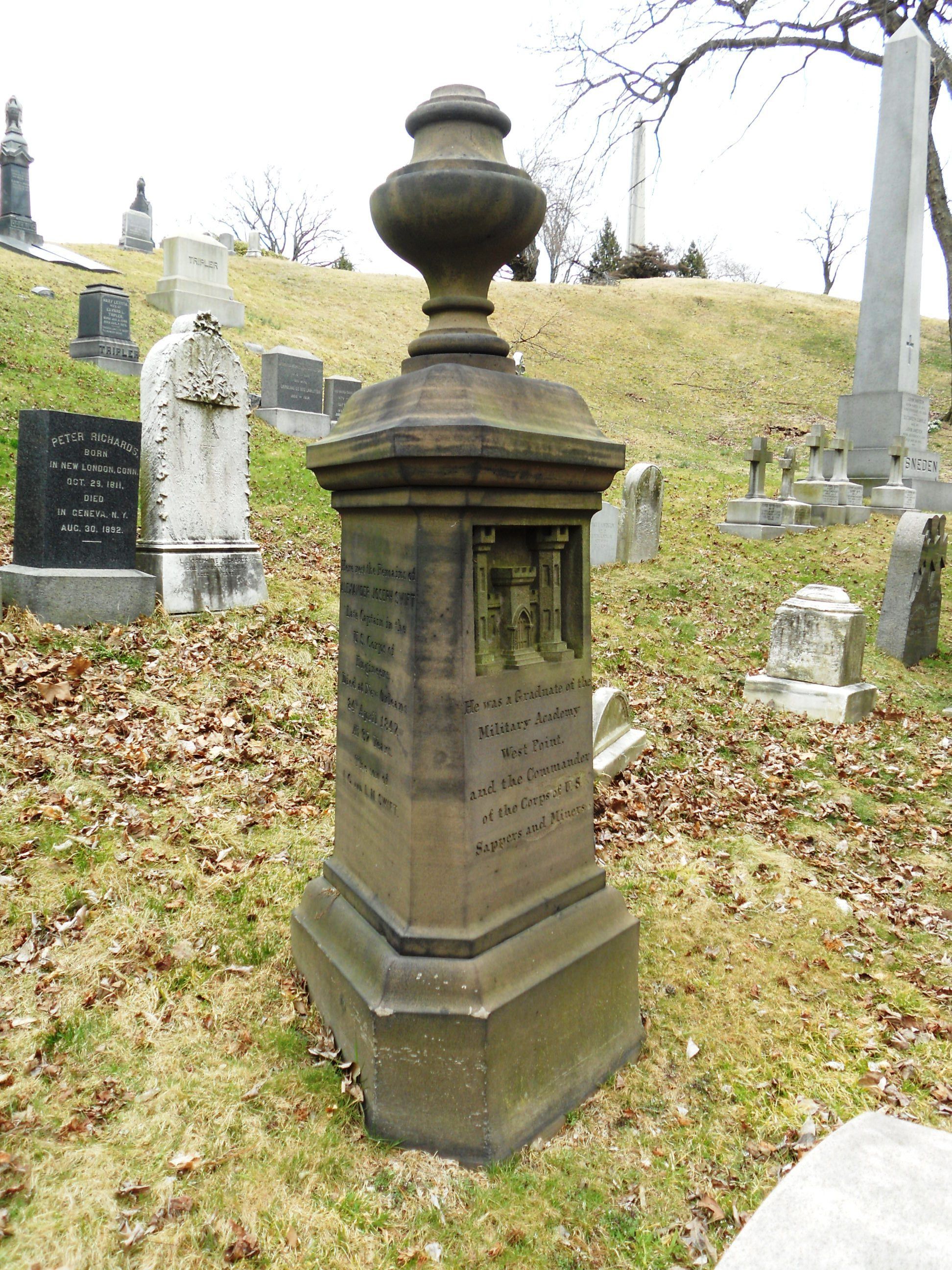He was the son of General Joseph G. Swift and Louisa Walker Swift.
He never married.
Times-Picayune Wednesday, April 28, 1847
Obituary
Died, in this city, on the 24th instant, Captain Alexander J. Swift, of the Corps of Engineers, United States Army, aged thirty-seven years. The deceased was the son of General Joseph Swift, of New York, who served with distinction in the last war and was at one time the Chief Engineer of the United States Army.
Captain Swift entered the Military Academy as a cadet, in the year 1826 at the early age of sixteen and was graduated in 1830, having maintained, throughout the term of studies at that institution, the first place of honor in his class, while his elevated character and irreproachable conduct acquired for him the esteem and respect not only of his fellow cadets, but of his teachers and superior officers. The writer well recollects him at this period of his career, as the one from whom (while acting as Assistant Professor in Mathematics) he received his first lessons, upon his entrance to the Academy.
Captain Swift was appointed 2d Lieutenant of Engineers in 1830 and in 1838 was promoted to a captaincy. It being contemplated by the War Department to raise a company of engineer soldiers, he was selected to visit France, in 1840, for the purpose of acquiring, at the French Schools of practice, practical information as to the organization and exercises of this, to us, novel description of troops. Having successfully accomplished this object, he returned to this country in 1841. It was not, however, until the breaking out of the Mexican War, in May 1846, that Congress finally passed a law authorizing the raising of a company of these troops.
Captain Swift was immediately appointed to the command of it and it speaks highly of his zeal and energy in the discharge of the duties assigned him, that the company thus authorized in May was on ship board for the seat of war in September. This, indeed would be nothing extraordinary in the raising of a company of infantry or cavalry; but the peculiar species of troops thus raised by Captain Swift was entirely new in our service. Besides the usual exercises of infantry soldiers, these soldiers (most of whom were required to be accustomed to some mechanical trade) had to be exercised in the difficult operations of sapping, mining, the management of pontoon bridges and all the various and complicated operations required of Engineer troops in the field, as in a war of sieges.
With all his diligence, Captain Swift was unable to reach the army in time for the assault of Monterey, (where the presence of his company would have been of the utmost importance) and the operations of the winter afforded no other occasion for its services. Unfortunately for him he as at this period attacked with a disease which has been fatal to so many of our troops on the Rio Grande – the dysentery.
He had, however nearly recovered, when the Vera Cruz expedition offered him an opportunity for displaying the peculiar qualities of his company, which he could not resist. He landed with the army, before Vera Cruz and so persevering was he in his effort to accomplish the duties of his station that it finally became necessary to carry him from the ground in a litter, he having sunk down at his post utterly exhausted. From the effects of the imprudent exertion he never recovered. A severe relapse of his disease was the consequence. He arrived here from Vera Cruz on the 9th instant, cherishing the hope that rest and change of climate would again restore him. But disease had already done its work. From the moment of his arrival here his strength rapidly failed him and his career terminated even before those of his friends who were most conscious of his precarious condition were prepared for so sudden a result.
Thus, by the insidious hand of disease has fallen one eminently gifted with all the most elevated qualities of the soldier and the gentleman. Had he fallen in the battlefield, in the brilliant discharge of those duties for which he had spent his life preparing himself, the event would have been less deplorable. His fate was peculiarly hard – his campaign of six months in Mexico was but one continued struggle with disease, terminated only by death.
An acquaintance of eighteen years' duration (during a portion of which intimately associated by professional duties) would enable the writer to testify to the high qualities of the deceased, as exhibited in social interview or in the discharge of public duties. To those who ever once knew him, such testimony would be unnecessary. To others, it will be sufficient to add, that in him, the Corps of Engineers of which he was a member, has lost one of its brightest ornaments – the army, a zealous and accomplished officer.
J.G.B.
He was the son of General Joseph G. Swift and Louisa Walker Swift.
He never married.
Times-Picayune Wednesday, April 28, 1847
Obituary
Died, in this city, on the 24th instant, Captain Alexander J. Swift, of the Corps of Engineers, United States Army, aged thirty-seven years. The deceased was the son of General Joseph Swift, of New York, who served with distinction in the last war and was at one time the Chief Engineer of the United States Army.
Captain Swift entered the Military Academy as a cadet, in the year 1826 at the early age of sixteen and was graduated in 1830, having maintained, throughout the term of studies at that institution, the first place of honor in his class, while his elevated character and irreproachable conduct acquired for him the esteem and respect not only of his fellow cadets, but of his teachers and superior officers. The writer well recollects him at this period of his career, as the one from whom (while acting as Assistant Professor in Mathematics) he received his first lessons, upon his entrance to the Academy.
Captain Swift was appointed 2d Lieutenant of Engineers in 1830 and in 1838 was promoted to a captaincy. It being contemplated by the War Department to raise a company of engineer soldiers, he was selected to visit France, in 1840, for the purpose of acquiring, at the French Schools of practice, practical information as to the organization and exercises of this, to us, novel description of troops. Having successfully accomplished this object, he returned to this country in 1841. It was not, however, until the breaking out of the Mexican War, in May 1846, that Congress finally passed a law authorizing the raising of a company of these troops.
Captain Swift was immediately appointed to the command of it and it speaks highly of his zeal and energy in the discharge of the duties assigned him, that the company thus authorized in May was on ship board for the seat of war in September. This, indeed would be nothing extraordinary in the raising of a company of infantry or cavalry; but the peculiar species of troops thus raised by Captain Swift was entirely new in our service. Besides the usual exercises of infantry soldiers, these soldiers (most of whom were required to be accustomed to some mechanical trade) had to be exercised in the difficult operations of sapping, mining, the management of pontoon bridges and all the various and complicated operations required of Engineer troops in the field, as in a war of sieges.
With all his diligence, Captain Swift was unable to reach the army in time for the assault of Monterey, (where the presence of his company would have been of the utmost importance) and the operations of the winter afforded no other occasion for its services. Unfortunately for him he as at this period attacked with a disease which has been fatal to so many of our troops on the Rio Grande – the dysentery.
He had, however nearly recovered, when the Vera Cruz expedition offered him an opportunity for displaying the peculiar qualities of his company, which he could not resist. He landed with the army, before Vera Cruz and so persevering was he in his effort to accomplish the duties of his station that it finally became necessary to carry him from the ground in a litter, he having sunk down at his post utterly exhausted. From the effects of the imprudent exertion he never recovered. A severe relapse of his disease was the consequence. He arrived here from Vera Cruz on the 9th instant, cherishing the hope that rest and change of climate would again restore him. But disease had already done its work. From the moment of his arrival here his strength rapidly failed him and his career terminated even before those of his friends who were most conscious of his precarious condition were prepared for so sudden a result.
Thus, by the insidious hand of disease has fallen one eminently gifted with all the most elevated qualities of the soldier and the gentleman. Had he fallen in the battlefield, in the brilliant discharge of those duties for which he had spent his life preparing himself, the event would have been less deplorable. His fate was peculiarly hard – his campaign of six months in Mexico was but one continued struggle with disease, terminated only by death.
An acquaintance of eighteen years' duration (during a portion of which intimately associated by professional duties) would enable the writer to testify to the high qualities of the deceased, as exhibited in social interview or in the discharge of public duties. To those who ever once knew him, such testimony would be unnecessary. To others, it will be sufficient to add, that in him, the Corps of Engineers of which he was a member, has lost one of its brightest ornaments – the army, a zealous and accomplished officer.
J.G.B.
Inscription
Here rest the Remains of
Alexander Joseph Swift
Late Captain in the
U.S. Corps of
Engineers:
Died at New Orleans
24th April 1847,
AE 37 Years.
The son of
I.G. and L.M. Swift.
He was a Graduate of the
Military Academy
West Point.
and the Commander
of the Corps of U.S.
Sappers and Miners.
Family Members
-
![]()
James Foster Swift
1806–1830
-
![]()
Como Jonathan Williams Swift
1808–1877
-
![]()
Thomas Delano Swift
1812–1829
-
![]()
Julius H. Swift
1815–1850
-
![]()
Sarah Delano Swift Richards
1816–1876
-
![]()
McRee Swift
1819–1896
-
![]()
Louisa Josephine "Josê" Swift Richards
1821–1859
-
![]()
Harriett Walker Swift
1824–1826
-
![]()
Charlotte F. Swift
1826–1840
-
![]()
James Thomas Swift
1829–1890
-
![]()
Dr Foster Swift
1833–1875
Advertisement
Advertisement




















